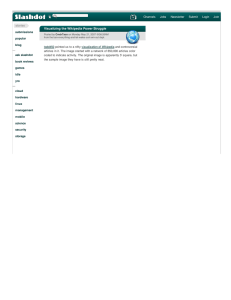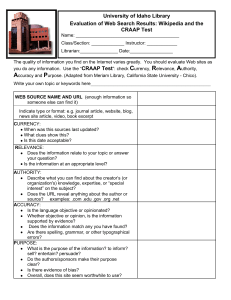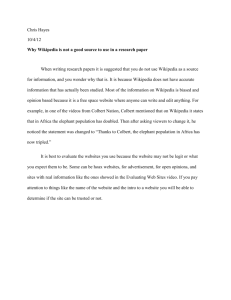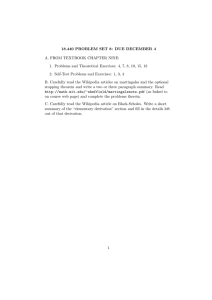Motivations for Contributing to Health-Related Articles on Wikipedia: An Interview Study
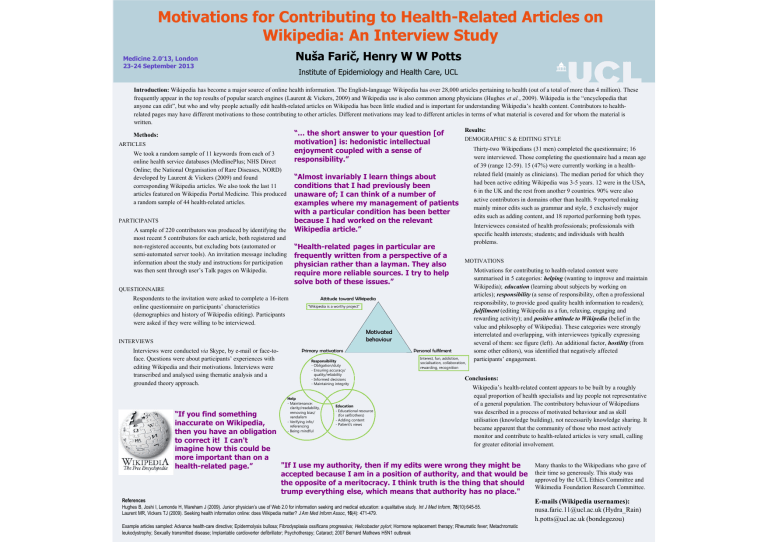
Motivations for Contributing to Health-Related Articles on
Wikipedia: An Interview Study
Medicine 2.0’13, London
23-24 September 2013
Nuša Farič, Henry W W Potts
Institute of Epidemiology and Health Care, UCL
Introduction: Wikipedia has become a major source of online health information. The English-language Wikipedia has over 28,000 articles pertaining to health (out of a total of more than 4 million). These frequently appear in the top results of popular search engines (Laurent & Vickers, 2009) and Wikipedia use is also common among physicians (Hughes et al.
, 2009). Wikipedia is the “encyclopedia that anyone can edit”, but who and why people actually edit health-related articles on Wikipedia has been little studied and is important for understanding Wikipedia’s health content. Contributors to healthrelated pages may have different motivations to those contributing to other articles. Different motivations may lead to different articles in terms of what material is covered and for whom the material is written.
Results:
Methods:
DEMOGRAPHIC S & EDITING STYLE
ARTICLES
We took a random sample of 11 keywords from each of 3 online health service databases (MedlinePlus; NHS Direct
Online; the National Organisation of Rare Diseases, NORD) developed by Laurent & Vickers (2009) and found corresponding Wikipedia articles. We also took the last 11 articles featured on Wikipedia Portal Medicine. This produced a random sample of 44 health-related articles.
PARTICIPANTS
A sample of 220 contributors was produced by identifying the most recent 5 contributors for each article, both registered and
“… the short answer to your question [of motivation] is: hedonistic intellectual enjoyment coupled with a sense of responsibility.”
“Almost invariably I learn things about conditions that I had previously been unaware of; I can think of a number of examples where my management of patients with a particular condition has been better because I had worked on the relevant
Wikipedia article.”
T hirty-two Wikipedians (31 men) completed the questionnaire; 16 were interviewed. Those completing the questionnaire had a mean age of 39 (range 12-59). 15 (47%) were currently working in a healthrelated field (mainly as clinicians). The median period for which they had been active editing Wikipedia was 3-5 years. 12 were in the USA,
6 in the UK and the rest from another 9 countries. 90% were also active contributors in domains other than health. 9 reported making mainly minor edits such as grammar and style, 5 exclusively major edits such as adding content, and 18 reported performing both types.
Interviewees consisted of health professionals; professionals with specific health interests; students; and individuals with health problems.
non-registered accounts, but excluding bots (automated or semi-automated server tools). An invitation message including information about the study and instructions for participation was then sent through user’s Talk pages on Wikipedia.
QUESTIONNAIRE
“Health-related pages in particular are frequently written from a perspective of a physician rather than a layman. They also require more reliable sources. I try to help solve both of these issues.”
MOTIVATIONS
Motivations for contributing to health-related content were summarised in 5 categories: helping (wanting to improve and maintain
Wikipedia); education (learning about subjects by working on
Respondents to the invitation were asked to complete a 16-item online questionnaire on participants’ characteristics
(demographics and history of Wikipedia editing). Participants
Attitude toward Wikipedia
“Wikipedia is a worthy project” articles); responsibility (a sense of responsibility, often a professional responsibility, to provide good quality health information to readers); fulfilment (editing Wikipedia as a fun, relaxing, engaging and rewarding activity); and positive attitude to Wikipedia (belief in the were asked if they were willing to be interviewed.
INTERVIEWS
Motivated behaviour value and philosophy of Wikipedia). These categories were strongly interrelated and overlapping, with interviewees typically expressing several of them: see figure (left). An additional factor, hostility (from
Interviews were conducted via Skype, by e-mail or face-toface. Questions were about participants’ experiences with editing Wikipedia and their motivations. Interviews were transcribed and analysed using thematic analysis and a grounded theory approach.
Primary motivations
Responsibility
- Obligation/duty
- Ensuring accuracy/ quality/reliability
- Informed decisions
- Maintaining integrity
Personal fulfilment
Interest, fun, addiction, socialisation, collaboration, rewarding, recognition some other editors), was identified that negatively affected participants’ engagement.
Conclusions:
Wikipedia’s health-related content appears to be built by a roughly
“If you find something inaccurate on Wikipedia, then you have an obligation to correct it! I can't imagine how this could be more important than on a health-related page.”
Help
- Maintenance: clarity/readability, removing bias/ vandalism
- Verifying info/ referencing
- Being mindful
Education
- Educational resource
(for self/others)
- Adding content
- Patient’s views equal proportion of health specialists and lay people not representative of a general population. The contributory behaviour of Wikipedians was described in a process of motivated behaviour and as skill utilisation (knowledge building), not necessarily knowledge sharing. It became apparent that the community of those who most actively monitor and contribute to health-related articles is very small, calling for greater editorial involvement.
"If I use my authority, then if my edits were wrong they might be accepted because I am in a position of authority, and that would be the opposite of a meritocracy. I think truth is the thing that should trump everything else, which means that authority has no place."
References
Hughes B, Joshi I, Lemonde H, Wareham J (2009). Junior physician’s use of Web 2.0 for information seeking and medical education: a qualitative study.
Int J Med Inform , 78 (10):645-55.
Laurent MR, Vickers TJ (2009). Seeking health information online: does Wikipedia matter?
J Am Med Inform Assoc , 16 (4): 471-479.
Many thanks to the Wikipedians who gave of their time so generously. This study was approved by the UCL Ethics Committee and
Wikimedia Foundation Research Committee.
E-mails (Wikipedia usernames): nusa.faric.11@ucl.ac.uk (Hydra_Rain) h.potts@ucl.ac.uk (bondegezou)
Example articles sampled: Advance health-care directive; Epidermolysis bullosa; Fibrodysplasia ossificans progressiva; Helicobacter pylori ; Hormone replacement therapy; Rheumatic fever; Metachromatic leukodystrophy; Sexually transmitted disease; Implantable cardioverter defibrillator; Psychotherapy; Cataract; 2007 Bernard Mathews H5N1 outbreak
